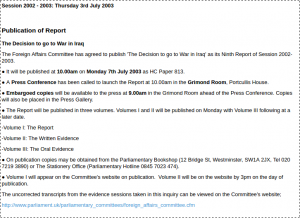Anyone who is working on more accessible/useful versions of the Chilcot Report should be aware of the following issues with Annex 2 – Glossary.
First, the “glossary” appears to be a mix of acronyms, with their expansions, along with random terms or phrases for which definitions are offered. For example, “FFCD – Full, Final and Complete declaration,” immediately followed by “Five Mile Market – Area in Basra.” (at page 247)
Second, the concept of unique acronyms never occurred to the authors:
AG Adjutant General
AG Advocate General
AG Attorney General
(page 235)AM Aftermath
AM Air Marshal
(page 236)BCU Basic Capability Unit
BCU Basra Crimes Unit
(page 238)BOC Basra Operational Command
BOC Basra Operations Centre
(page 238)CG Commander General
CG Consul General
CG Consulate General (see BEO)
(page 240)CIC Coalition Information Centre
CIC Communication and Information Centre
(page 240)CO Cabinet Office
CO Commanding Officer
(page 241)DCC Deputy Chief Constable
DCC Dismounted Close Combat
(page 243)DG Diego Garcia
DG Director General
(page 244)DIA Defence Intelligence Agency
DIA Department of Internal Affairs
(page 244)DPA Data Protection Act
DPA Defence Procurement Agency
(page 245)DSP Defence Strategic Plan
DSP Deployable Spares Pack
(page 245)EP Equipment Plan
EP Equipment Programme
(page 246)ESC Emergency Security Committee
ESC Executive Steering Committee
(page 246)EST Eastern Standard Time
EST Essential Services Team
(page 246)FP Force Posture
FP Force Protection
(page 247)IA Interim Administration
IA Iraqi Army
(page 250)ID Identification
ID (US) Infantry Division
(page 251)ING Iraqi National Gathering
ING Iraqi National Guard
(page 252)IO Information Operations
IO International Organisations
(page 252)ISG Information Strategy Group
ISG Iraq Security Group
ISG Iraq Strategy Group
ISG Iraq Survey Group
(page 253)MAS Manned Airborne Surveillance
MAS Muqtada al-Sadr
(page 256)Op Operation
OP Operative Paragraph
(page 260)OSD US Office of the Secretary of Defense
OSD Out of Service Date
(page 261)PM Prime Minister
PM Protected Mobility
(page 262)RA Research Analysts
RA Regular Army
(page 264)RDD Radiological Dispersal Devices
RDD Required Delivery Date
(page 264)SAF Small Arms Fire
SAF Stabilisation Aid Fund
(page 265)SC Security Committee
SC Security Council
(page 265)SE Scottish Executive
SE South-East
(page 266)SFA Service Family Accommodation
SFA Strategic Framework Agreement
(page 266)SG Secretary-General
SG Special Groups
(page 266)SLA Scottish Lord Advocate
SLA Service Level Agreement
(page 266)SSE Sensitive Site Exploitation
SSE Spring Supplementary Estimate
(page 267)UNSC UN Security Council
UNSC UN Special Co-ordinator
(page 270)
Yes, seventy-four (74) items that may be mistaken in any automated processing of the text.
Third, there are items in the glossary that don’t appear in the text outside of the glossary:
H of C House of Commons page 249
HoC House of Commons page 250
The House of Commons is never referred to by “H of C” or “HoC” outside of the glossary.
Fourth, there are items in the glossary that are not specialized vocabulary, as though the glossary is also a mini-English dictionary:
de facto In fact
de jure According to law
(page 244)
Fifth, the acronyms as mis-leading. For example, if you search for “EPW – Enemy Prisoners of War” (is there another kind?), outside of the glossary there is only one (1) “hit:”
the-report-of-the-iraq-inquiry_section-061.pdf.txt:Communication] and handling of EPW [Enemy Prisoners of War]”.
If you search for the other acronym, “PW – Prisoner of War,” outside of the glossary there is only one (1) “hit:”
the-report-of-the-iraq-inquiry_section-064.pdf.txt:A mass PW [prisoner of war] problem and/or a humanitarian crisis could both
With only casual knowledge of the war in Iraq, that doesn’t sound right does it?
Try searching for “prison.” That will return 185 “hits.”
Interesting isn’t it? The official acronyms (plural) return one “hit” each and a term not in the glossary returns 185 “hits.”
Makes me wonder about the criteria for inclusion in the glossary.
You?
If you are working with the Chilcot report I hope you find these comments useful. I working on an XML format version of the glossary that treats this as acronym -> expansion, suitable for putting the expansion markup inline.
The report randomly, from a reader’s perspective, uses acronyms and expansions. Consistently recording the acronyms and expansions will benefit readers and researchers. Two audiences ignored in the Chilcot Report.
